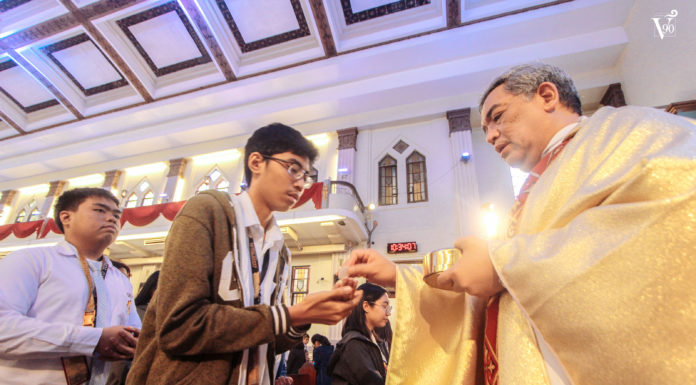
VISIBLY irked after a hobnob discussion with fellow student leaders from the Faculty of Arts and Letters as to the kind of stand (or stance) it would take regarding the current political turmoil sweeping the land, a brethren of the pen texted me the following: “If the knowledge of truth on the current government’s alleged corruption will rock the boat sailing toward the country’s economic development, should the truth be made public?
The government answers: No. And majority of the country’s political and business decision-makers gives a ready nod. Ours is a history alongside those of developed capitalist societies whose inevitable choice was monetary comfort over morality.”
For sideline realists, the guy has a point. Beaming through his words flushed me back to the time when as a ten-year-old neighborhood eavesdropper, I overheard my playmate telling his brother: “Kuya, ang saya ni mommy kasi nalaman niya na nakakuha ako ng star (read: perfect score) sa long quiz namin kanina!”
Stunned, the brother replied: “Ha?…e pa’no nangyari ‘yon, e ‘di ba bobo ka sa math? Alam naman natin lahat ‘yon.” My playmate said: “…‘wag mo na lang ipagkalat…binigay ko ‘yung koleksyon ko ng NBA cards sa classmate ‘kong magaling sa math. In return pakokopyahin n’ya ko…sayo ko lang sinabi ‘to, nakukunsensya ‘ko pero ‘eto lang naisip kong paraan para mapasaya si mommy sa birthday. Pasensya na talaga…Sana maitindihan mo.” (Tough luck for him, I heard everything).
Whittling a consciousness to an environment smacking of amoral retribution if only to fill the purse and, in effect, the stomach, has become the template of survival not only in this country of ours nowadays.
Add more the utility of existence which has become too demanding, if not overbearing that even a five-year old boy would howl in protest over mom’s choice not to return, lest answer the cellular phone which a young lady left as she alighted from an FX taxi one Sunday afternoon, “para ‘di ko na bibilhan pa (ng cellphone) ‘yung kuya mo, menos gastos pa, ‘di ba?” What the mother did can be construed as a “soft crime,” reverberating on dishonesty that is. It is the type of moral violation often described by the hardened charlatans both on the streets and in government as below the belt yet “malayo pa sa bituka,” — permissible in bureaucratic parlance.
Recently, I happened to dump by the word “apathy” for the nth time while talking to a fellow Artlet who told me he had had enough of inaction by his peers against the “social cancer” that should be exposed (read: publicized) to its “cure.” While panning his patriotic rage, I asked myself: To whose grandfather should we credit this prevailing culture (though relative to some) of apathy? My second question is: What cure is he talking about?
The generation which spawned our conception of apathy as a people, I believe, began as early as the colonial period when the invading powers then brutishly inculcated in us a sense of insecurity. Nonchalantly downcast as a lesser man, Juan’s enthusiasm often meets a natural death whenever Señor Pedro or Sir Joe highlights his flaws, which although minimal, are passed up as something colossal to merit respect and recognition. Besides, it barely fares well according to “international standards,” prompting the hardworking and enthusiastic Juan to lose heart in what he is capable of doing – and achieving. It won’t benefit him anyway. “E bakit nga naman ako magpapakahirap kung ‘di naman nila naa-appreciate ‘yung ginagawa ko?” Hence, Juan, engulfed by this defeatist mentality, reduces himself to a lump of mediocrity and insensitivity that even when taxpayer’s money – his own money – is looted by its supposed protectors, he hardly gives a damn.
To his mind, he is not the only one sharing the tragedy of being robbed in “creative” ways. Raiding the coffers is scandalous inasmuch as public officials are held in high regard, but what if they’re not? It then becomes the norm of immoderate proportions.
In any case, we share the guilt of trying to arrogate social services unto ourselves. The classical mindset is that we, taxpayers or not, deserve to experience these social services at the comfort of our own personal circumstances.
Why will a topnotch executive from a multinational firm, who religiously pay his taxes, bother to seek medical assistance in a barangay health center when he could send himself to a hospital suite?
If ever medicine funds were stolen in that lowly health center, will he care? But what if he was held-up and the cop who should have come to his aid barely lifted a finger against those thugs who harassed him? Will he throw invectives at the policeman, such as: “sayang ‘yung binabayad naming tax para suwleduhan ang mga kagaya ‘mong buwaya! Walang silbi.” (You decide).
Surprisingly, the erstwhile disinterested yuppie becomes reunited with the collective, overtaxed, underpaid horde in his midst because he has directly experienced being short-changed for the benefit he deems to reap upon paying his taxes. Read: selfishness.
And what about the cure my fellow Artlet was belching with fuming conviction? Revolution it was (if you lose, it’s rebellion). But given the exigencies of the day, will anyone bother to vacate his workdesk for the time being or take a leave from combing the streets to sell tinapa or pandesal, just to protest the government for its ineptitude? Others who can afford to shun a day’s work are then left to “represent” them. Read: Pseudo-heroism, interest hi-jacking.
Conspicuously, how can, say businessmen, speak on behalf of a balut vendor when, in essence he is alien, to the environmental ramblings? One can always say he or she is “one with the people,” but whose people is he or she talking about? The people in posh shopping malls? The people in casinos? The people in jail? The people in the slums?
The problem then lies in the “uniform demand of the hungry to be fed”, as what Hannah Arendt tells us in her book On Revolution.
Poverty is surmountable but not its bastardized form – misery. Arendt tells us that poverty is typified by an exclusion from public life, which leads us to surmise why revolutions barely appeal to those who have a handful of mouths to feed.
On the other hand, misery is characterized by a desperate need for sustenance. To some, sustenance does not end up with having to eat three square meals a day. It’s more than what meets one’s recommended dietary allowance. It’s not even vitamins.
There is caprice, and with it, greed, because those representative cliques exploit the unwitting political tolerance of the “busy” sector of society.
Mark the word: show-stealers.

















